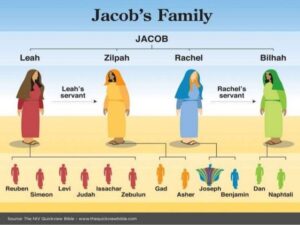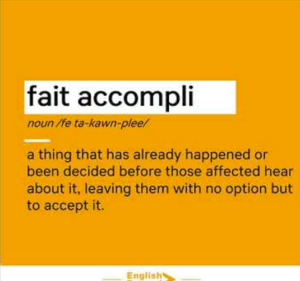Pikuday 2022: Fait ac·com·pli & Kudos to the Team
by devadmin | March 3, 2022 10:25 pm
Raboyseyee and Ladies,
Fait ac·com·pli & Kudos to the Team:
Says the heylige Internet that a fait accompli is a thing that has already happened or been decided before those affected hear about it, leaving them with no option but to accept it. More below, ober, let’s begin here.
Was Betzalel the architect, or but the project and construction manager of the Mishkan? Whatever his title, was he alone in charge? Who was Oholiov? And was he but Betzalel’s assistant, or his equal? Were others involved? We shall address these questions below, ober first, a quick review of just how Betzalel and Oholiov were selected and appointed.
A few parshas back, the RBSO called upon the Yiddin to build Him a Mishkan, a place where His Essence would reside. As mentioned over the past few weeks, four entire parshas and parts of Ki Sisa are dedicated to the project. The final actions – the completion, assembly/disassembly during the trial run, and the proverbial ribbon cutting ceremony are detailed in this week’s parsha of Pikudai which closes out Sefer Shmois. Purim and Pesach are mamish around the corner.
As is customary, with the job completed, it’s time to dole out a few acknowledgements to those who executed the plan to perfection. Let’s go back and see who is deserving of credit and shout them out. We begin with Betzalel and Oholiov. We were first introduced to them, the master artisans responsible for the construction of the Tabernacle and its appurtenances a few shabbosim back. If you went through the yeshiva system, you are of course very familiar with Betzalel ben Uri ben Chur, he of Sheyvet Yehudah. He was the man! Let’s go back to see how the RBSO first introduced him. Says the heylige Toirah in Ki Sisa, (Shmois 31:1-6), azoy:
| 1. The Lord spoke to Moishe, saying: | אוַיְדַבֵּ֥ר יְהֹוָ֖ה אֶל־משֶׁ֥ה לֵּאמֹֽר: | |
| 2. “See, I have called by name Betzalel the son of Uri, the son of Chur, of the tribe of Yehudah, | ברְאֵ֖ה קָרָ֣אתִי בְשֵׁ֑ם בְּצַלְאֵ֛ל בֶּן־אוּרִ֥י בֶן־ח֖וּר לְמַטֵּ֥ה יְהוּדָֽה: | |
| 3. and I have imbued him with the spirit of G-d, with wisdom, with insight, with knowledge, and with [talent for] all manner of craftsmanship | גוָֽאֲמַלֵּ֥א אֹת֖וֹ ר֣וּחַ אֱלֹהִ֑ים בְּחָכְמָ֛ה וּבִתְבוּנָ֥ה וּבְדַ֖עַת וּבְכָל־מְלָאכָֽה:
|
|
| 4. to do master weaving, to work with gold, with silver, and with copper, | דלַחְשֹׁ֖ב מַֽחֲשָׁבֹ֑ת לַֽעֲשׂ֛וֹת בַּזָּהָ֥ב וּבַכֶּ֖סֶף וּבַנְּחֽשֶׁת:
|
|
| 5. with the craft of stones for setting and with the craft of wood, to do every [manner of] work. | הוּבַֽחֲר֥שֶׁת אֶ֛בֶן לְמַלֹּ֖את וּבַֽחֲר֣שֶׁת עֵ֑ץ לַֽעֲשׂ֖וֹת בְּכָל־מְלָאכָֽה: | |
| 6. And, behold, with him I have placed O’ho’li’ov the son of Achisomoch, of the tribe of Don, and all the wise hearted into whose hearts I have instilled wisdom, and they shall make everything I have commanded you: | ווַֽאֲנִ֞י הִנֵּ֧ה נָתַ֣תִּי אִתּ֗וֹ אֵ֣ת אָֽהֳלִיאָ֞ב בֶּן־אֲחִֽיסָמָךְ֙ לְמַטֵּה־דָ֔ן וּבְלֵ֥ב כָּל־חֲכַם־לֵ֖ב נָתַ֣תִּי חָכְמָ֑ה וְעָשׂ֕וּ אֵ֖ת כָּל־אֲשֶׁ֥ר צִוִּיתִֽךָ: |
From what’s written in Ki Sisa, we know this: the RBSO dedicated four entire pisukim describing how Betzalel was imbued with skill sets he likely did not have, or may never have known he had. And then in posik 6, the RBSO tells us that He has also called upon a man by the name of Oholiov. And if that weren’t enough manpower, the posik also tells us that the RBSO also instilled wisdom upon “all the wise hearted men,” and “they” -seemingly a new group of specialists “shall make everything I have commanded you.” Who were these people? Ver veyst? They go unnamed. And what do we know about Oholiov at this point? Only his name, his father’s name and the tribe he hailed from. What we know is that the RBSO seemingly assigned him to work with Bezalel. As his assistant? We don’t know. Veyter: In last week’s parsha of Vayakhale (Shemois 35:30, 34, and 35), we read this:
| 30. Moishe said to the children of Israel: “See, the Lord has called by name Betzalel, the son of Uri, the son of Chur, of the tribe of Yehudah. | לוַיֹּ֤אמֶר משֶׁה֙ אֶל־בְּנֵ֣י יִשְׂרָאֵ֔ל רְא֛וּ קָרָ֥א יְהֹוָ֖ה בְּשֵׁ֑ם בְּצַלְאֵ֛ל בֶּן־אוּרִ֥י בֶן־ח֖וּר לְמַטֵּ֥ה יְהוּדָֽה: | |||||
| 34. And He put into his heart [the ability] to teach, both him and O’ho’li’ov, the son of Achisomoch, of the tribe of Don. | לד וּלְהוֹרֹ֖ת נָתַ֣ן בְּלִבּ֑וֹ ה֕וּא וְאָֽהֳלִיאָ֥ב בֶּן־אֲחִֽיסָמָ֖ךְ לְמַטֵּה־דָֽן: | |||||
| 35. He imbued them with wisdom of the heart, to do all sorts of work of a craftsman and a master worker and an embroiderer with blue, purple, and crimson wool, and linen and [of] weavers, those who do every [manner of] work, and master weavers. | להמִלֵּ֨א אֹתָ֜ם חָכְמַת־לֵ֗ב לַֽעֲשׂוֹת֘ כָּל־מְלֶ֣אכֶת חָרָ֣שׁ | וְחשֵׁב֒ וְרֹקֵ֞ם בַּתְּכֵ֣לֶת וּבָֽאַרְגָּמָ֗ן בְּתוֹלַ֧עַת הַשָּׁנִ֛י וּבַשֵּׁ֖שׁ וְאֹרֵ֑ג עֹשֵׂי֙ כָּל־מְלָאכָ֔ה וְחֽשְׁבֵ֖י מַֽחֲשָׁבֹֽת: | |||||
In pisukim 30-34, Moishe tells us about the various skills the RBSO imbued onto Betzalel and in 34 we read that the RBSO put into the hearts of Betzalel and Oholiov the ability to teach. In 35, the following posik, the Toirah tells us that they were both filled with “wisdom of the heart” to do all sorts of work. Seemingly, both were now equally skilled artisans. And from our parsha (Shemois 36:2), this:
| 2. And Moishe called Betzalel and O’ho’li’ov and every wise hearted man into whose heart the Lord had given wisdom, everyone whose heart lifted him up to approach the work to do it. | בוַיִּקְרָ֣א משֶׁ֗ה אֶל־בְּצַלְאֵל֘ וְאֶל־אָֽהֳלִיאָב֒ וְאֶל֙ כָּל־אִ֣ישׁ חֲכַם־לֵ֔ב אֲשֶׁ֨ר נָתַ֧ן יְהֹוָ֛ה חָכְמָ֖ה בְּלִבּ֑וֹ כֹּ֚ל אֲשֶׁ֣ר נְשָׂא֣וֹ לִבּ֔וֹ לְקָרְבָ֥ה אֶל־הַמְּלָאכָ֖ה לַֽעֲשׂ֥ת אֹתָֽהּ: |
It’s time to build put their skills to work. Moishe called together the entire team, Betzalel, Oholiov, along with “every wise hearted man” to complete the work. Seemingly, it takes a village.

Says the Rashbam: the word “lihoirois” means that Betzalel was given the special gift of being able to teach others. Betzalel was not only a master craftsman; he was also a master and willing teacher. Says the Ohr Hachaim so gishmak, azoy: there are many wise men whose wisdom remains in their hearts alone, for they do not know how to teach others. The heylige Toirah therefore told us by using the words in posik 34 above, azoy: regarding Betzalel, this was not the case; rather, he placed it (his wisdom) in his heart to teach. Pshat is that Betzalel placed his wisdom in his heart to teach, he mastered the art of teaching. Sadly, not all wise people share their wisdom and the heylige Gemora (Yoma 38a) tells us that in the times of the Beis Hamikdash (Temple times), there were those who had special skills and wisdom who refused to share. The house of Garmu (family with that name) did not want to teach others how to bake the lechem haponim (the showbread) which was changed weekly. And the house of Avtinas refused to teach other how to prepare the kitoires (the incense offering we wrote about two weeks ago). Betzalel and his apprentice Oholiov were different. The RBSO gifted them with the gift of re-gifting their wisdom. The bottom line: Ershtens, there are times when re-gifting is not only acceptable but preferable. Another bottom line: it’s avada good to have been born with wisdom. Ober it’s also possible to achieve success and fame if and when the RBSO calls you out for greatness and give you the right amount of wisdom. As well, it’s very helpful if one has a good and willing teacher. One who is enthusiastic about seeing the success of his protégé.
Let’s notice that kimat every time the heylige Toirah mentions Betzalel, another good man by the name of O’ho’li’ov is also shouted out? Who was he? Where did he come from? Why was he specifically mentioned by name and appointed by the RBSO? We don’t know because for reasons only the RBSO knows, He decided not tell us much about him. Typically, when that happens, the medrish is all over it but not this time. Preciously little information is found in the medrish on Oholiov’s background and or, skill set. The good news: precious little does not translate to nothing. Shoin, now that you read all about Oholiov and how he was handpicked by the RBSO, how he was imbued with the same skills Betzalel had or was given, the question is azoy: why is that the name Oholiov does not roll off your tongues? Why is it that we recall Betzalel, his father and grandfather, ober when it comes to Oholiov, a nechtiger tug (fuhgeddaboudit)? And taka you should all be ashamed of yourselves for not knowing this great man, one with many talents and skills, perhaps as many as Betzalel himself. Do you or anyone you know have a child named Oholiov? Have you ever considered that name? He must have been a somebody and this week, as we conclude Sefer Shmois (Book of Exodus) with Parshas Pikudei, the Ois wants all to know and remember O’ho’li’ov ben Achisomoch.
Says Rashi: Oholiov was from the sheyvet (tribe) of Don and avada you recall that Don was one of the twelve sons of Yaakov. Let us recall that each of the sons, no matter their behavior -which was at times, questionable at best, and mostly much worse, merited their own tribe. Says Rashi: Don was one of the lower tribes, meaning not as important as Yehudah and a few others. Was there really a difference in status among the twelve shevotim? Seemingly there was, and as medrish will explain just below, Don was -in this caste system of tribes- from the lower rungs. The bottom line: despite all the trouble favoritism caused over the previous generations – let’s recall Yitzchok & Yishmoel, Yaakov & Eisav, Yoisef & his holy brothers), it continued unabated. Azoy iz iz (it’s just how it goes).

Says the Medrish (Medrish Rabbah), azoy: Reb Chanina ben Pazzi said azoy: “there is no greater tribe among the tribes than the tribe of Yehudah. And there is no lower tribe than that of Don who was born to one of the pilagshim (concubines) of Yaakov. Avada you recall that Yaakov managed to marry Leah, Rochel, Bilha and Zilpa -seemingly in very short order- the latter two being the handmaidens of Leah and Rochel. Taka he got a late start in life and married only a 84, but look at what he was able to accomplish: four of a kind; a winning hand in every casino. Though their status was upgraded to full wives when Yaakov married and had children with them, based on what the medrish says, they never really achieved “full” status. Why not? Ver veyst. Moreover, do we read anyplace that Don caused any problems? We don’t! Veyter in the medrish: Said the RBSO “let a member of the tribe of Don be matched with a member of the tribe of Yehudah so that people should not demean Don, and so that no person should become haughty. This is so that a great person and a lowly person are equal before the RBSO as evidenced by the fact that Betzalel is from the tribe of Yehudah and Oholiov is from the tribe of Don, and that the RBSO ordained that Oholiov joined Betzalel to build the Mishkan. OMG: did you read all that? Amazing and gishmak. On the one hand, medrish tells us that the shevotim did belong to a class system with Don being last. On the other, we learned that the RBSO decided to pair Oholiov with Betzalel davka to show that all people- those from good stock and those from a poorer breed- are equal in His eyes!? What’s taka pshat? How do reconcile these two views? Ver veyst? On the other hand, let’s not go meshuga; it’s but a medrish; who says it has to be emes?
Says the heylige Gemora (Buba Basra 8b), azoy: one should entrust the public duties to at least two people. And from the specific appointment of Oholiov, though from sheyvet Don, we are efsher being taught a valuable lesson: all are equal in the eyes of the RBSO when it comes to the service of the RBSO. One without a shvartze-hittel (black hat), burd (beard) and tzitzis sticking out of his pants, one who is perhaps not as pious -at least on the outside- is just as qualified as is one who is (or at least appears) more religious. If one wants to get close to the RBSO, all are welcome. Says Rabbi Munk: Oholiov enjoyed neither privileged birth, nor the zichus ovis (ancestral merit) which accompanied and inspired Betzalel’s appointment.
 The bottom line: it’s widely understood and well-known that Betzalel took the lead as project manager on the Mishkan project, ober, we cannot discount Oholiov ben Achisomoch who was either Betzalel’s assistant, ‘right hand man,’ or just as important to the enterprise. He too was responsible for the success of this great endeavor. Says the medrish (Yalkut Shimoni), azoy: in this undertaking there were two tribes that worked as partners; the tribe of Yehuda (represented by Betzalel) and the tribe of Don (represented by Oholiov). It seems somewhat unnecessary to emphasize the point that two tribes were responsible for the project, especially given the fact that Betzalel could surely have accomplished it alone. Says Reb Chaim Zaytchik that working together with Oholiov was part of Betzalel’s greatness. He could have insisted that he work alone as the chief artisan, rather than sharing the limelight with another. Especially so given that he was descended from such an auspicious tribe, and Oholiov arose from the lowly tribe of Don. Instead of seeking all the praise for himself, he welcomed Oholiov to partner with him in this creation, the surest sign that his intentions were pure. Ober, says the heylige Ois azoy, let’s get real: it was the RBSO -not Betzalel- who handpicked Oholiov. Betzalel was not given a choice.
The bottom line: it’s widely understood and well-known that Betzalel took the lead as project manager on the Mishkan project, ober, we cannot discount Oholiov ben Achisomoch who was either Betzalel’s assistant, ‘right hand man,’ or just as important to the enterprise. He too was responsible for the success of this great endeavor. Says the medrish (Yalkut Shimoni), azoy: in this undertaking there were two tribes that worked as partners; the tribe of Yehuda (represented by Betzalel) and the tribe of Don (represented by Oholiov). It seems somewhat unnecessary to emphasize the point that two tribes were responsible for the project, especially given the fact that Betzalel could surely have accomplished it alone. Says Reb Chaim Zaytchik that working together with Oholiov was part of Betzalel’s greatness. He could have insisted that he work alone as the chief artisan, rather than sharing the limelight with another. Especially so given that he was descended from such an auspicious tribe, and Oholiov arose from the lowly tribe of Don. Instead of seeking all the praise for himself, he welcomed Oholiov to partner with him in this creation, the surest sign that his intentions were pure. Ober, says the heylige Ois azoy, let’s get real: it was the RBSO -not Betzalel- who handpicked Oholiov. Betzalel was not given a choice.

Another view: Says the Malbim, azoy: the RBSO imbued in Betzalel an abundance, efsher an overabundance, of inspiration and light. He had enough to do all that was instructed. As well, he had enough to pass on, and so he did to Oholiov, who was his assistant in all matters dealing with the Mishkan. Ober asks the heylige Ois azoy: Was Oholiov taka but an assistant? Not according to the Ibn Ezra who says that “Oholiov was equal to Betzalel in all areas of work and skill.” Moreover, let’s not forget that the RBSO also selected and also imbued Oholiov with the same skillset as Betzalel. Says the heylige Toirah (Shmois 35:35), azoy: “He imbued them….” Bottom line: Oholiov did not require Betzalel’s favors; he too was handpicked for greatness.
| He imbued them with wisdom of the heart, to do all sorts of work of a craftsman and a master worker and an embroiderer with blue, purple, and crimson wool, and linen and [of] weavers, those who do every [manner of] work, and master weavers. | להמִלֵּ֨א אֹתָ֜ם חָכְמַת־לֵ֗ב לַֽעֲשׂוֹת֘ כָּל־מְלֶ֣אכֶת חָרָ֣שׁ | וְחשֵׁב֒ וְרֹקֵ֞ם בַּתְּכֵ֣לֶת וּבָֽאַרְגָּמָ֗ן בְּתוֹלַ֧עַת הַשָּׁנִ֛י וּבַשֵּׁ֖שׁ וְאֹרֵ֑ג עֹשֵׂי֙ כָּל־מְלָאכָ֔ה וְחֽשְׁבֵ֖י מַֽחֲשָׁבֹֽת: |
Ober, if Betzalel was selected, and only after, imbued with the skillsets necessary for the job, why davka was he selected? Or, was it the case, that Betzalel was already skilled and therefore selected? The RBSO could have selected many other individuals and given them the same skill set. Grada, the RBSO, as the heylige Toirah teaches us did just that. And while we glossed over the others involved – those whom the RBSO instilled with wisdom (And, behold, with him I have placed Oholiov the son of Achisomoch, of the tribe of Don, and all the wise hearted into whose hearts I have instilled wisdom), let us now recall them and give them a shout out.
Why taka was he picked? Ershtens: we never question the RBSO. For reasons that are none of your or my business, the RBSO picked him; no further questions! One does not need yichus (pedigree) if handpicked by the RBSO. Also, we learned that Betzalel’s grandfather was Chur who was mercilessly killed by the Yiddin during the eygel fiasco. Says the medrish azoy: The RBSO wanted to recognize Chur’s good deeds and then handpicked Betzalel, his grandson, for recognition and greatness. The bottom line as the Ois’s rebbe would repeat quite often: “Der Abishter blybt nisht a ba’al choiv.” In English: the RBSO does not remain a debtor. When the time was right, He gifted Betzalel with prophecy along with other skills needed for the project.
Ober, what about Oholiov? Was he but Betzalel’s’ apprentice or assistant? Or, was he an equal partner who shared responsibilities and together they were the master craftsmen? Says the Ibn Ezra that “Oholiov was equal to Betzalel in all areas of work and skill.” And let’s check out the Malbim who says so gishmak, azoy: There are times when G‑dly inspiration comes to an individual for the sake of his own wisdom or for his own prophecy. Then there are times when the inspiration is in such abundance that the person is merely a vehicle through which the light passes on to others. Betzalel was so filled with inspiration that it overflowed to Oholiov, who was a ready and worthy recipient, and from him, it flowed to all the others. In other words: Oholiov was the vessel through which the Divine inspiration for building the Tabernacle flowed forth to all the builders and craftsmen.

Shoin, earlier we asked if Betzalel was the architect or but the project manager along with Oholiov? Says the heylige Ois azoy: Neither! Nor Betzalel or Oholiov were the architects of the Tabernacle. Say what? The sole architect was the RBSO. Did He not dedicate two entire parshas (Teruma and Tetzaveh) to the design instructions? He did! He alone had the vision of the Mishkan, how it was to be designed, laid out and built. He alone relayed the plans in great and colorful detail to Moishe. The RBSO imagined the design plans, the materials needed, specific measurements and all else, to include the priestly vestments. He alone revealed them to Moishe. Who was in charge of implementing them? Say the Sifse Chachomim that Betzalel was in charge. Oholiov helped him with his tasks, and the two of them delegated yet other responsibilities to the others, those the RBSO gifted with wise hearts. In other words, the two of them led the team and were in charge. They are the only ones shouted out by name. The others, those with wise hearts- as mentioned mamish just above- remain anonymous in the heylige Toirah, and this week, the heylige Ois shouts them out; kudos and great work! The final bottom lines: When first introduced, the RBSO told Moishe that Betzalel and Oholiov were already chosen to oversee the work of building the tabernacle. It was a fait ac·com·pli.

Shoin, speaking of fait accompli, recently a local shul the Ois attends -in search of a new rabbi to replace one who served with distinction but announced his retirement after 34 years- did the same. The committee -seemingly also inspired with “wise hearts” came across a candidate who just stood out above all others and shoin. Fait accompli, zul zeyn mit mazel and kudos to them as well!
Betzalel was an incredibly accomplished artisan. As revealed later, he was a metalworker, jeweler, gem-cutter and woodworker. One parsha later (Shmois 35:35), he is described as an engraver, designer, embroiderer and weaver. With his ability, intelligence, and knowledge in every kind of craft, Betzalel certainly had the qualifications necessary to serve as the project manager for the job. Oholiov too was equal in skill level. Above all, Betzalel was filled with “divine spirit.” Interestingly, this is the first biblical record of someone being “filled with the Spirit of G-d.” Mamish? Logic might taka have dictated that other Toirah personalities including our heylige Ovis (forefathers), and or Yoisef and Moishe would be the recipients of such spirit: Not! Betzalel, a blue-collar craftsman, a layperson, and an unsung hero go the nod! We do not know much about Betzalel’s background except his brief genealogy recorded when first introduced and repeated one parsha later. What we know about him is that he was a man of many gifts and skills and that he used them to give glory to the RBSO and to benefit his people and community. Were his gifts and skills developed overnight when he became filled with the Divine Spirit? Could well be. On the other hand, he was most likely born with artistic gifts that later further developed through his training and work. Through the empowerment of the RBSO’s Spirit, he was able to use them for the building of the tabernacle — for the glory of the RBSO and the benefit of the community. The final bottom line: it’s good to have the RBSO on your side. We all have different gifts; what we need is some inspiration to figure out what they are and how to use them.
Chazak- Chazak- Vinischazake!
A gittin Shabbis and Choidesh Adar Shaynee!
The Heylige Oisvorfer Ruv
Yitz Grossman
Source URL: https://oisvorfer.com/pikudei-2022-fait-ac%c2%b7com%c2%b7pli-kudos-to-the-team/